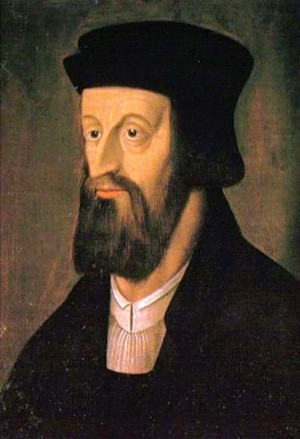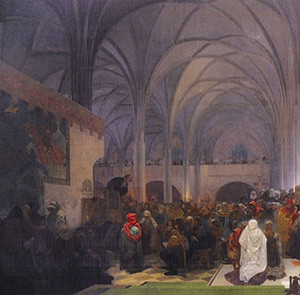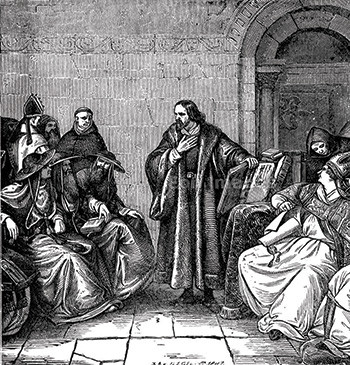In the heart of Prague’s Old Town Square, a commanding monument dedicated to Huss John stands as a testament to his enduring impact. Erected in 1915, this grand statue commemorates the 500th anniversary of the martyrdom of this pivotal Czech reformer. Engraved at its base are his powerful words: “Love each other and wish the truth to everyone,” often summarized as “the truth prevails!” The year 2015 marked the 600th anniversary of Huss John’s death, providing a poignant moment to reflect on his life, ministry, and lasting influence, even though his name remains unfamiliar to many.
Huss John, born around 1372 and tragically executed in 1415, was a devoted pastor and courageous church reformer who emerged from humble beginnings in southern Bohemia. His academic journey led him to the University of Prague, now known as Charles University, where he earned his master’s degree in 1396. His academic prowess led him to become a faculty member that same year, teaching until 1412, and serving as both dean and rector. During these formative years, Huss John immersed himself in the writings of the English reformer John Wycliffe, whose ideas profoundly shaped his own.
While Huss John resonated with Wycliffe’s Augustinian theology, particularly his understanding of the church, he was also influenced by Bohemian thinkers closer to home.
 John Hus Monument in Prague's Old Town Square, commemorating the legacy of the reformer Huss John.
John Hus Monument in Prague's Old Town Square, commemorating the legacy of the reformer Huss John.
In 1402, Huss John took on a significant additional role as pastor of the Bethlehem Chapel, which became the epicenter of the burgeoning Bohemian Reform movement. The name “Bethlehem,” meaning “house of bread,” was deliberately chosen for this chapel, established as a place for preaching in the common vernacular, Czech, rather than the traditional Latin. This period was marked by widespread corruption and moral decay within the Western Catholic Church. Huss John’s sermons fearlessly addressed these issues, particularly the pervasive practice of simony – the buying and selling of church offices. Wealthy families often secured ecclesiastical positions for their sons to guarantee comfortable and lucrative lives, leading to a spiritual crisis as these leaders often neglected their pastoral duties. Huss John’s passionate sermons tackled moral purity, clerical celibacy, and the abuse of indulgences, provoking the ire of the clergy and church hierarchy.
Similar to the early life of John Calvin, details about Huss John’s personal conversion remain scarce. However, it is clear that early in his ministry, he became deeply convinced of the truth of Scripture. This conviction led him to prioritize obedience to God’s Word over papal decrees or church traditions whenever they diverged. Huss John’s letters offer the most intimate glimpse into his inner life and motivations. He frequently reminded his followers of the powerful words from Acts 5:29, “We ought to obey God rather than men.” This unwavering stance against Church teachings that contradicted Scripture led to repeated condemnations and ultimately, his excommunication.
Following his fourth excommunication, Huss John voluntarily went into exile from 1412 to 1414, finding refuge among sympathetic nobles in southern Bohemia. This period of isolation proved remarkably productive. He penned numerous influential works, including his seminal treatise on the church, De Ecclesia, in 1413. Other significant writings from this time include On Simony, commentaries on the Apostles’ Creed, the Ten Commandments, and the Lord’s Prayer, and a devotional guide titled The Daughter, or How to Know the Correct Way to Salvation, written for a community of women he knew through a friend. In 1414, Huss John, believing he would have a chance to defend his views, agreed to attend the Council of Constance in Germany. This council was convened not only to address the “Hussite heresy” but also to resolve the Papal Schism, a crisis that began in 1378 with initially two, and later three, rival popes vying for supremacy.
Despite his hopes for a fair hearing, Huss John was imprisoned upon arrival and condemned as a heretic, specifically as a follower of Wycliffe. Despite persistent pressure to recant his beliefs, he remained steadfast. He was stripped of his priesthood and tragically burned at the stake on July 6, 1415, branded as an obstinate heretic.
Huss John’s Enduring Impact on Protestantism
The teachings and martyrdom of Huss John resonated deeply with early Protestant reformers, most notably Martin Luther. Luther’s initial skepticism towards Huss John transformed into profound admiration and respect. His shift occurred when he encountered Huss John’s sermons in his monastery library, an encounter that astonished him with their theological alignment. Luther’s growing endorsement of Huss John shocked his contemporaries, culminating in his famous declaration in February 1520: “I have taught and held all the teachings of Jan Hus, but thus far did I not know it . . . In short, we are all Hussites and did not know it.” This recognition of Huss John’s pre-Reformation influence has persisted among Protestants. Harry Emerson Fosdick, in his 1952 work Great Voices of the Reformation, underscored Huss John’s unwavering commitment to the Bible as a pivotal point.
Behind all else in Huss’ teaching stood his devotion to the Scriptures as the ultimate guide of life and thought. Here we run decisively upon one of the major issues dividing Roman Catholicism from the whole movement which issued in the Protestant Reformation. According to Roman dogma one did not believe in the church because Scriptures say so, but believed in the Scriptures because the church says so.
Some scholars even consider Huss John an “evangelical” forerunner. David Otis Fuller’s Valiant for the Truth: A Treasury of Evangelical Writings (1961) includes excerpts from Huss John’s writings on the church, highlighting his conviction in absolute truth and biblical authority. James McGraw’s Great Evangelical Preachers of Yesterday (1961) begins with Wycliffe and Huss John, seeing them as precursors to Luther and the Reformation. McGraw defines “evangelical” as “preaching the good news” with the purpose of “the exaltation of Christ and the nurture of faith in his power to save.” Timothy Larsen’s Biographical Dictionary of Evangelicals (2003) includes Huss John, recognizing his significant influence on the broader evangelical movement, even within David Bebbington’s definition of evangelicalism originating in the 1730s.
Despite this strong Protestant affinity, it’s crucial to acknowledge, as Thomas Fudge, a leading scholar on Huss John, emphasizes, that “Jan Hus was a medieval Catholic reformer rather than a premature Protestant.” Huss John adhered to traditional Catholic doctrines such as transubstantiation, purgatory, and the intercession of the Virgin Mary. Nevertheless, Huss John remains a towering figure of reform whose life and teachings offer invaluable lessons for the contemporary church.
Huss John’s Timeless Message for Today’s Church
 John Hus preaching at Bethlehem Chapel, illustrating Huss John's emphasis on vernacular preaching and biblical teaching.
John Hus preaching at Bethlehem Chapel, illustrating Huss John's emphasis on vernacular preaching and biblical teaching.
Huss John’s legacy speaks powerfully to the challenges and opportunities facing the church today. His life and writings provide enduring principles for Christian living and church reform.
Grounded in Scripture
First and foremost, Huss John challenges us to be deeply rooted in Scripture. On the eve of his execution, he implored his friends in Bohemia, “Be diligent in the Word of God,” a constant refrain throughout his ministry. In an age of distractions and biblical illiteracy, Huss John’s emphasis on Scripture is profoundly relevant. He lamented the superficial engagement with Scripture even among believers, urging a deeper commitment to God’s Word. Huss John personally testified to Scripture as his “foundation and food, by which my spirit is refreshed, that it may be strong against all adversaries of the truth.” He passionately encouraged others to hunger for the Word, conform to its teachings, and “stand firmly in the love of the Word of God, and cleave to it with the greatest desire.” Huss John embodies the principle of Knowing & Doing, emphasizing both understanding and living out biblical truth. He urged his Prague congregation to “gladly attend the preaching, diligently hear it; and hearing it, understand it; and understanding it, keep it; and keeping it, learn to know yourselves; and learning to know yourselves, know rightly your dearest Saviour.” This emphasis on hearing the Word placed a high responsibility on preachers, whom Huss John urged to preach with diligence, believing he preached “not I, but principally the Holy Spirit.” His involvement in revising the Czech Bible underscores his commitment to making Scripture accessible to all. Like Luther and Calvin after him, Huss John dedicated himself to studying and proclaiming the truths of Scripture.
Christ as the Head of the Church
Secondly, Huss John reminds us to uphold Jesus Christ as the supreme head of the church. His understanding of the church was biblically formed, particularly through Paul’s writings and Augustine’s theology. For Huss John, the church was the community of all predestined believers, united in faith in Jesus Christ, not merely an institution controlled by popes or councils. While he respected church authority, his ultimate allegiance was to Christ and Scripture. He affirmed, “Whatever the holy Roman Church or the pope with the cardinals shall decree or order to be held or done according to the law of Christ, that I, humbly and as a faithful Christian, wish to respect and reverently to accept.” Huss John emphasized genuine inner faith over outward displays of piety, contrasting true believers with the hypocrisy he saw in some church leaders, reminiscent of the Pharisees. His communal view of the church stands in contrast to modern Western individualism, which can contribute to the secularization of the Christian community. Huss John’s principle of consistency challenged the decrees of a pope who lived “contrary to Christ,” the true head of the church. He believed true church unity was only possible through genuine faith rooted in Scripture. This principle calls us to evaluate church practices and ministries based on Scripture, not on personal agendas or power.
Centrality of Worship
Thirdly, Huss John recognized the crucial role of worship in connecting people to God, a concept further developed by Luther’s doctrine of the priesthood of all believers. He sought to shift the focus of worship towards God. He would be alarmed by the modern trend in some churches to prioritize announcements over Scripture reading or to diminish prayer in worship. He would also critique forms of worship that distract from God, whether through elaborate performances or overly charismatic displays. Huss John advocated for increased congregational participation and a “vertical flow” of worship, translating liturgy and hymns into the vernacular. He also challenged the practice of withholding the cup from the laity in communion. The Czech Reformation, inspired by Huss John, symbolized this return to biblical worship with the chalice and open Bible. Huss John’s insistence on both bread and wine in communion was rooted in his understanding of Scripture, arguing, “We ought not [to] follow custom, but Christ’s example and truth.”
Cultivating the Spiritual Life
Fourthly, Huss John’s life underscores the importance of cultivating a deep spiritual life. He would be dismayed by the shallow understanding of “Christian” in contemporary culture, where nominal faith often overshadows genuine discipleship. He urged his friend to “firmly and steadfastly love the Lord Jesus Christ,” emphasizing Christ’s suffering as an example for believers. Quoting Luke 9:23, “If anyone would come after me, let him deny himself and take up his cross and follow me,” Huss John acknowledged the challenge of discipleship, confessing, “O most kind Christ, draw us weaklings after Thyself, for unless Thou draw us, we cannot follow Thee!”
 John Hus at the Council of Constance, depicting Huss John's unwavering faith amidst adversity and persecution.
John Hus at the Council of Constance, depicting Huss John's unwavering faith amidst adversity and persecution.
He called believers to “follow Christ’s life in poverty, purity, humility,” and to embrace suffering for the sake of truth, stating, “Do not fear to die for Christ if you wish to live with Christ.” He also powerfully asserted, “It is better to die well than to live wickedly.” Given the rampant immorality he witnessed, Huss John stressed adherence to the Ten Commandments and exhorted all, both clergy and laity, to “live a devout and holy life.” He warned against outward religiosity without inner transformation, urging believers to build their spiritual house with the same care as their physical dwellings, emphasizing kindness to the poor and humble. Beyond Scripture reading and righteous living, Huss John emphasized prayer, particularly the Psalms, as vital for spiritual growth. He offered a realistic view of the Christian life as a journey, advising, “Always keep in mind what you are, what you were, and what you will be.”
Recognizing Temptation
Finally, Huss John urgently warns us about the reality of temptation and the subtle yet powerful influence of culture. He cautioned against naivete, recognizing that culture actively shapes us in ways often contrary to the Gospel. Huss John preached against materialism and neglecting the poor. He reminded a monk that “the basic rule for clerics concerning the owning of property…is to possess all things in common, according to Acts 2.” He quoted Bernard of Clairvaux, “A monk owning a farthing, is not worth a farthing.” Huss John used the metaphor of “the wheel of worldly vanity” to illustrate the fleeting pleasures of sin and their ultimate destructive consequences, leading to “eternal torment in fire and darkness.” He frequently spoke of the world, the flesh, and the devil as sources of temptation, urging vigilance and perseverance. He specifically warned against “debauchery” and “fornication,” urging spiritual combat against these temptations: “Whatever you do, fear God and keep His commandments. You will thus walk rightly and not perish, tame the flesh, spurn the world, vanquish Satan, put on God, find life, confirm others.” Huss John’s own life was a testament to enduring temptation and suffering. He faced betrayal from former friends and ministry colleagues, yet he consistently placed his hope in God. Shortly before his death, he affirmed, “God almighty will strengthen the hearts of His faithful whom He has chosen before the foundation of the world that they may receive the unfading crown of glory.”
The life and teachings of Huss John hold profound significance, not only for Luther and the Reformation, but for Christians today. His enduring message can be summarized in his powerful call: “Therefore faithful Christian, seek the truth, listen to the truth, learn the truth, love the truth, speak the truth, adhere to truth and defend truth to the death.”
Notes:
1 Czech and European writers typically refer to Hus as Jan Hus. Most Americans call him John Hus or Huss. I will follow the lead of most American publications and use Hus. 2 Matthew Spinka, trans., Letters of John Hus (Totowa, NJ: Rowman and Littlefield, 1972), 51, cf. 53, 36, etc. 3 Ľubomír Batka, “Jan Hus’ Theology in a Lutheran Context,” Lutheran Quarterly 23 (2009): 1. Luther’s approval is further demonstrated by the prefaces he wrote for various editions of Hus’s writings. Martin Luther, Luther’s Works: Sermons on the Gospel of St. John chapters 17–20, ed. Christopher Boyd Brown, vol. 69 (St. Louis: Concordia, 1958), 25 n 53. 4 Harry Emerson Fosdick, ed., Great Voices of the Reformation: An Anthology (New York: Random House, 1952), 40. Huss chapter at 37–65. 5 David Otis Fuller, ed., Valiant for the Truth: A Treasury of Evangelical Writings (New York: McGraw-Hill, 1961), ix. Huss chapter at 81–92. 6 James McGraw, Great Evangelical Preachers of Yesterday (New York: Abingdon, 1961), 7, 8. Huss chapter at 19–23. 7 Ibid., 9. 8 Timothy Larsen, ed., Biographical Dictionary of Evangelicals (Downers Grove, IL: InterVarsity, 2003), 1. Hus entry at 321–22. 9 Thomas Fudge, “Hussite Theology and the Law of God,” in The Cambridge Companion to Reformation Theology, ed. David Bagchi and David C. Steinmetz (Cambridge: Cambridge University Press, 2004), 25. 10 Ibid., 24; Thomas A. Fudge, Jan Hus: Religious Reform and Social Revolution in Bohemia (London: I.B. Tauris, 2010), 49, 50, 51, 60. 12 Ibid., 103, cf. 186, etc. 13 Ibid., 77, 93, 107. 14 bid., 115, cf. 93, 122, where Hus reinforces the necessity of both knowing and living out the truths of Scripture. 15 Ibid., 90, 34. 16 Ibid., 100–01, cf. 36, 52, 53. Hus is adamant that Jesus Christ is the true head of the church. Spinka, ibid., 96, etc. 17 Ibid., 99. 18 See, e.g., Constance Cherry, “My House Shall Be Called a House of . . . Announcements,” Church Music Worship (January–April 2005). 19 Spinka, Letters of John Hus, 181. 20 See Michael J. Wilkins, In His Image: Reflecting Christ in Everyday Life (Colorado Springs: NavPress, 1997), 35; Dallas Willard, The Divine Conspiracy (San Francisco: HarperSanFrancisco, 1998), 282. 21 Spinka, Letters of John Hus, 187, 43. 22 Ibid., 23, 170, 102. 23 Ibid., 153, 170, 128, 132. 24 Ibid., 121. 25 Ibid., 9, 153. 26 Ibid., 168. 27 IIbid., 69, 71. 28 Ibid., 177. 29 Ibid., 128, 129. 30 Ibid., 186. 31 Cited by Fudge, Jan Hus, 28.

